1960s
Elva Miller
Elva Miller was the Florence Foster Jenkins of the 1960s. From her bio on Wikipedia:But she laughed all the way to the bank. Her rendition of "Downtown" sold 250,000 copies in three weeks, and reached No. 82 on the Billboard Hot 100 singles chart in April 1966.
If you're up for more sonic abuse, you can find plenty of her recordings on youtube.
Posted By: Alex - Thu Feb 01, 2018 -
Comments (6)
Category: Ineptness, Crudity, Talentlessness, Kitsch, and Bad Art, Music, 1960s
Chet Huntley Explains the Strategic Air Command
Be sure to enjoy the SAC theme song starting around 6:30.
Posted By: Paul - Thu Feb 01, 2018 -
Comments (7)
Category: Government, Music, War, Weapons, 1960s
Follies of the Madmen #349
FRANK ZAPPA'S LUDEN'S COUGH DROPS COMMERCIAL from ED SEEMAN on Vimeo.
Posted By: Paul - Wed Jan 31, 2018 -
Comments (3)
Category: Business, Advertising, Products, Music, Patent Medicines, Nostrums and Snake Oil, 1960s
Operation Decoy
In August 1962, New York City cops began patrolling the streets at night while dressed as women. The idea was to trap would-be muggers.But not all the decoy cops were successful at apprehending the muggers. Patrolman Victor Ortiz got hit over the head by a mugger, lost his gun, and his assailant got away.
Update: Author Erika Janik discusses Operation Decoy in her book Pistols and Petticoats: 175 Years of Lady Detectives in Fact and Fiction. She places it within the context of an ongoing resistance within the police department during the mid-twentieth century to the idea of having female police officers:
Some even went so far as to suggest that male officers could simply dress as women for undercover work. In 1962, eight male officers did just that in order to trap muggers and rapists in New York City. "We want our men to look like housewives, not like Hollywood stars," explained Inspector Michael Codd, head of the tctical force. Twenty-seven-year-old patrolman Victor Ortiz wore white sandals, orange tapered pants, and a beige padded sweater on top of a bright print blouse. On hand to help the officers get ready were two policewomen, Caryl Collins and Dolores Munroe. The women stood by in their official uniforms as the men posed for the TV and newspaper cameras. Why teaching men to wear heels and put on lipstick was deemed more useful than simply deploying policewomen seems a question the reporters never asked. It's true that decoys did get attacked as part of these operations (that was the point), but all officers worked in teams with detectives standing by to apprehend suspects. In this instance, two of the disguised policemen had their purses snatched in Central Park and seven people were arrested in the overnight anti-mugging operation.

Orlando Evening Star - Aug 25, 1962

Greenville News - Aug 24, 1962
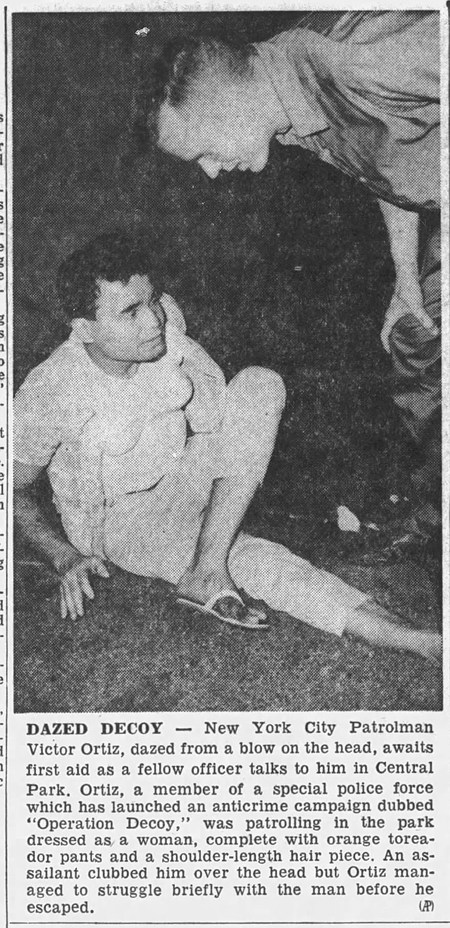
Allentown Morning Call - Aug 28, 1962

Posted By: Alex - Tue Jan 30, 2018 -
Comments (2)
Category: Police and Other Law Enforcement, Gender, 1960s
Swallowed the evidence
In November 1965, Walter Cunningham was arrested on suspicion of being involved in a jewel robbery. The police picked him up two days after the robbery, loitering outside a pawn shop. He didn't have the jewels on him, but when he later complained of a stomach ache, the police realized he had swallowed all the evidence: about 91 diamonds, a 20-karat ruby, and an emerald chip.Police Lt. Carl Schumacher told reporters, "We figure he must have swallowed the gems while he was being booked. He was probably standing there chomping away while our backs were turned."
Doctors subsequently recovered the jewels. Cunningham pleaded guilty to a federal charge of interstate transportation of stolen property.
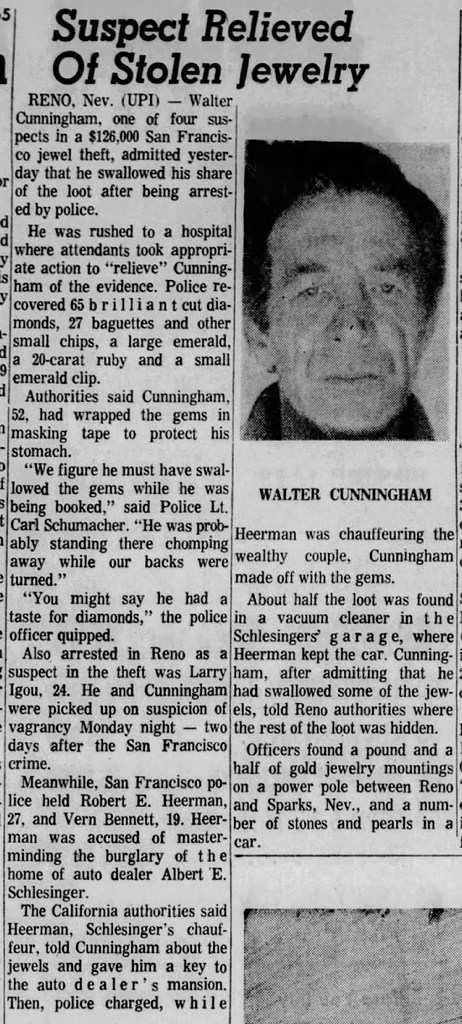
Santa Rosa Press Democrat - Nov 19, 1965
Posted By: Alex - Mon Jan 29, 2018 -
Comments (2)
Category: Crime, 1960s
THE TRIP
We hope you make it back!
Posted By: Paul - Sat Jan 27, 2018 -
Comments (1)
Category: Drugs, Psychedelic, Movies, Music, Pop Art, Surrealism, Bohemians, Beatniks, Hippies and Slackers, 1960s
Top Forty News, Weather and Sports
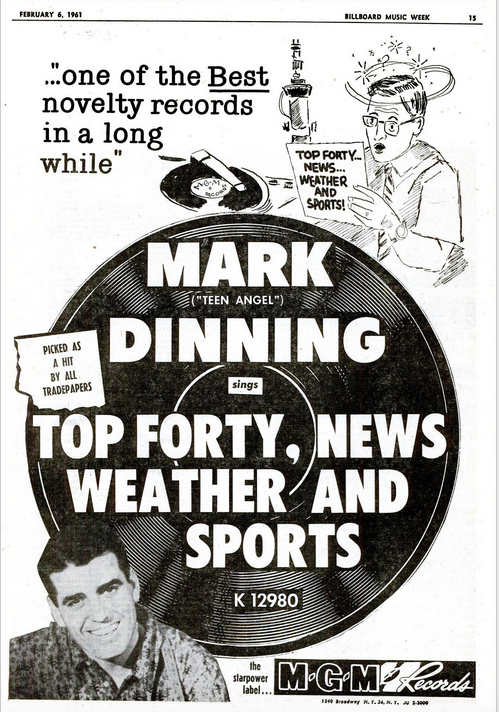
Posted By: Paul - Fri Jan 26, 2018 -
Comments (0)
Category: Humor, Journalism, Music, 1960s
Librarian Strikes Back
In February 1961, Harold Roth, director of the East Orange Library in New Jersey, made news by having arrest warrants made out for 14 people with overdue books. The degree of overdueness ranged from four months to one year. But what really attracted attention was the manner of the arrests. The police showed up at many of the houses around midnight to rouse the scofflaws out of bed and drag them down to jail.I think this 1961 case remains the largest mass round-up of people with overdue library books, but people still occasionally get arrested for not returning their library books in a timely fashion. The site publiclibraries.com has an article about "Jail time for overdue library books" that lists some more recent cases.
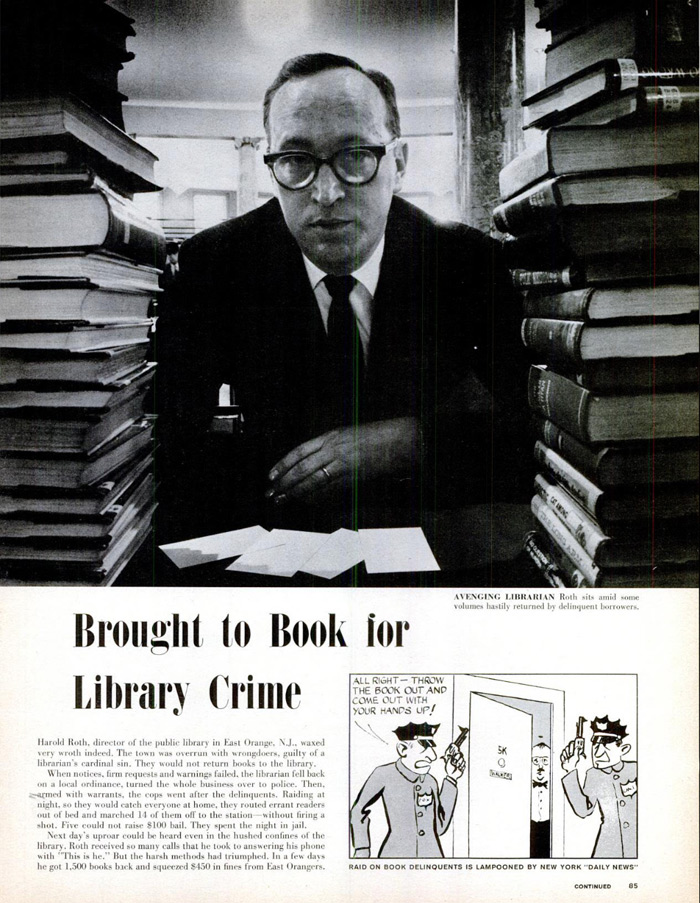
Life - Feb 17, 1961
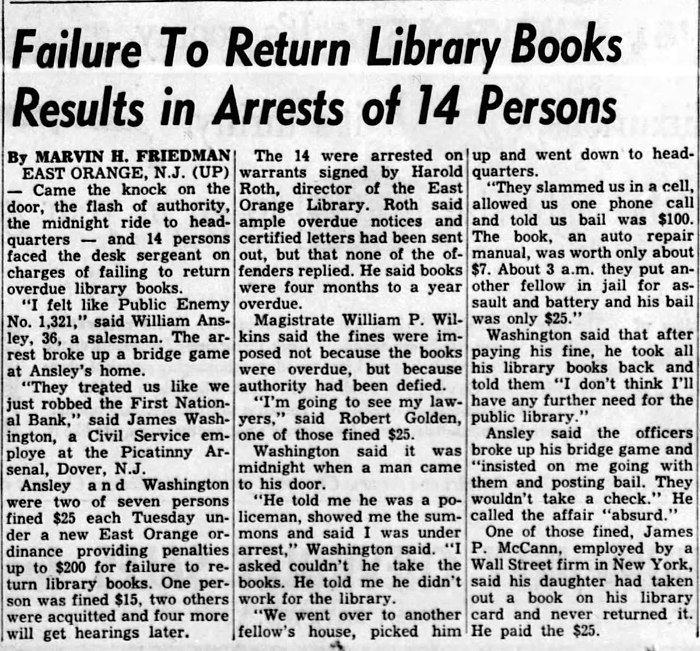
Green Bay Press-Gazette - Feb 8, 1961
Posted By: Alex - Wed Jan 24, 2018 -
Comments (10)
Category: Crime, Libraries, 1960s
Stars ‘n Stripes Girdle
Introduced in 1965 by the Treo Company, and promptly withdrawn from the market on account of complaints by the Daughters of the American Revolution."Patriotism should be encouraged by proper respect to the Stars and Stripes, the symbol of this great country and the many opportunities enjoyed here," Mrs. W. Carl Crittenden, national chairman of the DAR's Flag of the United States of America Committee, wrote.
"I believe that all patriotic citizens will agree with me that it is deplorable to downgrade our flag in this fashion."
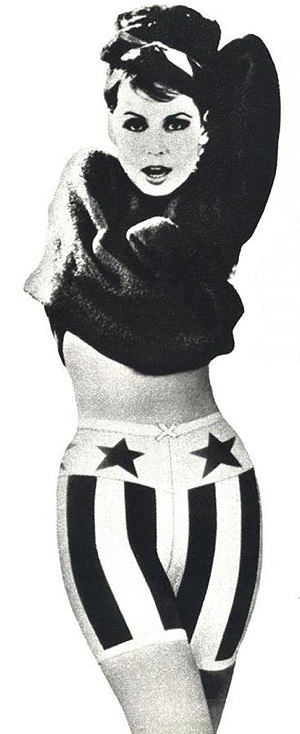
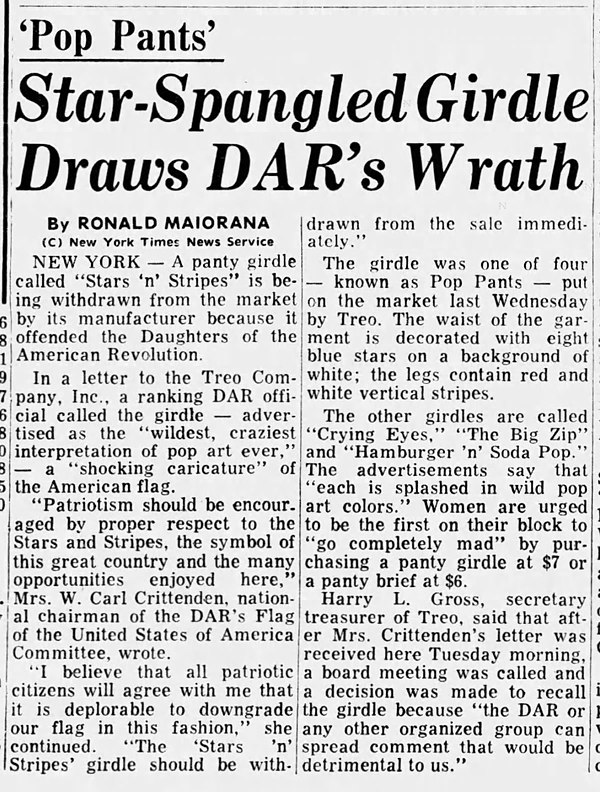
Allentown Morning Call - Aug 26, 1965
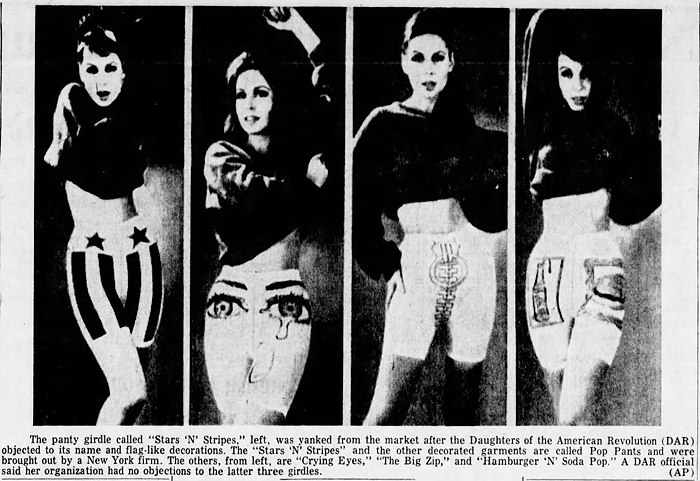
Hazleton Standard-Speaker - Aug 27, 1965
Posted By: Alex - Fri Jan 19, 2018 -
Comments (4)
Category: Fashion, Patriotism, Flags, 1960s
Fallout Biscuits
Back in 1961, the U.S. Office of Civil Defense came out with 'fallout biscuits.' They were vitaminized crackers. The idea was that people in fallout shelters could live on these for weeks, or even years, if necessary. The biscuits were cheap to make and lasted pretty much forever, so huge quantities were prepared.Fast-forward to the twenty-first century. The various places wheres the biscuits were stored, such as the University of Montana, now faced the problem of how to get rid of the thousands of boxes of these things.
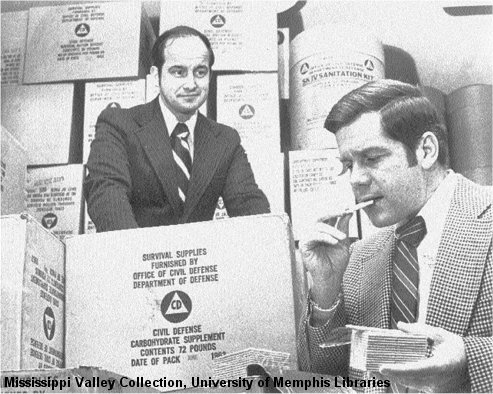
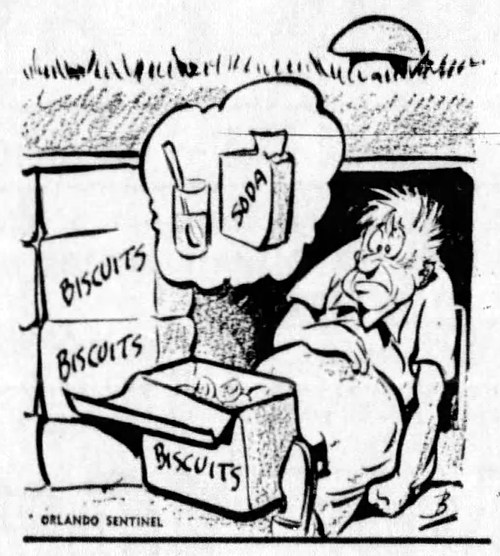
Orlando Sentinel - Jun 2, 1961
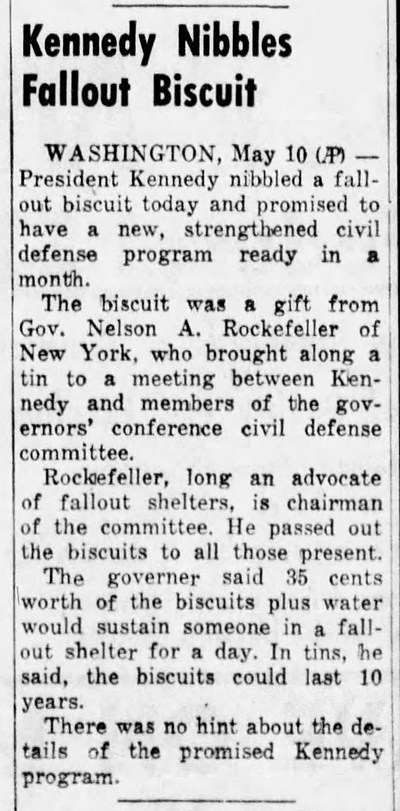
Fort Myers News-Press - May 11, 1961
Posted By: Alex - Wed Jan 17, 2018 -
Comments (4)
Category: Food, Atomic Power and Other Nuclear Matters, 1960s

| Who We Are |
|---|
| Alex Boese Alex is the creator and curator of the Museum of Hoaxes. He's also the author of various weird, non-fiction, science-themed books such as Elephants on Acid and Psychedelic Apes. Paul Di Filippo Paul has been paid to put weird ideas into fictional form for over thirty years, in his career as a noted science fiction writer. He has recently begun blogging on many curious topics with three fellow writers at The Inferior 4+1. Contact Us |




